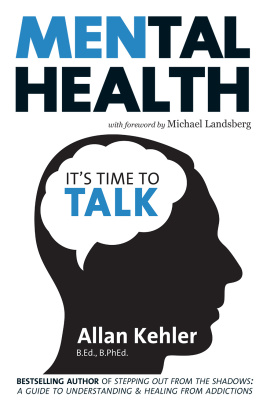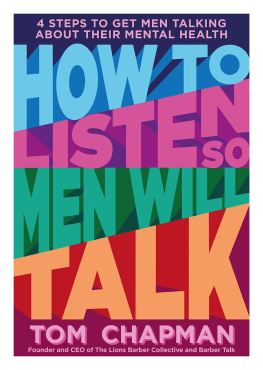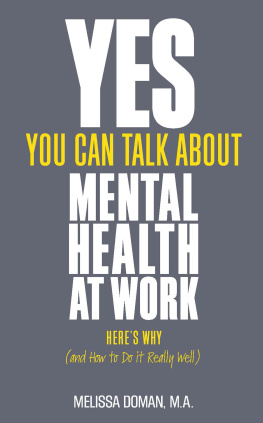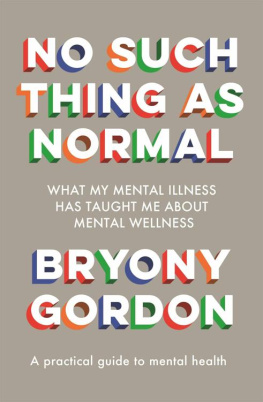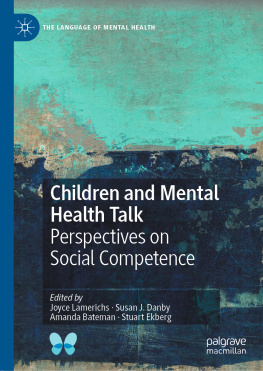MENtal Health: Its Time to Talk
Allan Kehler, 2020
No part of this publication may be reproduced, stored in a retrieval system or transmitted, in any form or by any means, without the prior written consent of the author or a licence from The Canadian Copyright Licensing Agency (Access Copyright). For an Access Copyright licence, visit www.accesscopyright.ca or call toll free to 1-800-893-5777.
This book contains stories from a variety of authors. All personal experiences shared in this book are used with permission.
This book was written for general education purposes only. The authors are not mental health professionals, and this information is not a substitute for medical care. If you or someone you know is experiencing a crisis, please call emergency services or seek professional help immediately. Every effort has been made to ensure that website addresses and phone numbers are accurate, however, this accuracy cannot be guaranteed.
A portion of the proceeds from the book sales will go toward Break the Barrier: Project Voice, a group of community partners and volunteers in Saskatoon, Saskatchewan, whose objective is to eliminate the stigma and discrimination that persons living with mental illness and substance use disorders experience every day.
More information can be found at https://breakthebarrier.ca/project-voice
Cataloguing data available from Library and Archives Canada.
Issued in print and electronic formats.
ISBN 978-1-988783-47-5 (softcover).ISBN 978-1-988783-48-2 (EPUB).ISBN 978-1-988783-49-9 (Kindle)
Editing, layout and design by Heather Nickel
Front cover image Vectorios2016
Production made possible with the support of Creative Saskatchewan.

www.outfromtheshadows.ca

Regina, SK.
www.ynwp.ca
To all the men
who continue to suffer in silence.
Contents
Men and Mental Health
Mental Illness
Facing Depression
Post-Traumatic Stress Disorder: After the Sirens
The Bridge
Life Beyond Anxiety and Depression
Addressing Mental Health in Rural Areas
Normalizing Mental Health in Agriculture
Mental Illness in a Small Town
Addiction
Facing My Pain
Becoming the Father I Knew I Could Be
Alcohol and Politics Dont Mix
Sexual Abuse
Silent No More
Suicide
Losing a Son to Suicide
Discovering Who I Am
Impacting Change for the Future
It Starts with Our Youth
Educating Our Youth
Changing How We View Mental Health in the Workplace
Modelling the Way
The Power of Support
Healing Through the Support of Others
Creating Support Groups for Healing
This Is What Happens When You Share
How to Support a Loved One
Supporting the Men in My Life
Supporting My Husband Through Mental Illness
Moving Toward Wellness
Foreword
There is a small space between naivet and ignorance. I believe I have found the sweet spot that incorporates both.
For ten years I suffered with depression and anxiety. I was aware of everything to do with my illness. What I wasnt aware of was the stigma surrounding it. Perhaps it was because I never really thought about it, perhaps because I never felt shame or embarrassment, or perhaps it was because a decade ago people seldom referred to it. Whatever the reason, I wasted a decade not using the platforms gifted to me by my job to help others. I was oblivious. I was naive. I was ignorant.
I chose to write the foreword to this book for a reason that may surprise you. I did it because of a lingering anger at my own naivet and ignorance. I have searched for people who understand what took me so long to figure out. In that search I found Allan Kehler. Allan is doing what I should have done a decade ago. He is using his pain to relieve the pain of others.
In this book are stories and insights into mental health aimed directly at men. Statistics show that both men and women suffer from mental illness equally but respond differently. Men seek help less often than women. Men refuse help because of an antiquated assumption that they must always remain strong. That assumption is fed by a stigma that tells them that depression is a weakness not a sickness. MENtal Health: Its Time to Talk is a direct challenge to this stigma. It makes the statement that mental illness is anything but a weakness.
I have met Allan twice. Both times we shared a stage at mental health events. I have found him to be powerful and relatable. I realized each time I wasnt actually listening to him as a fellow speaker or advocate, but as a sufferer of an illness that leaves me sometimes feeling alone and isolated. Allan made me feel less of each. I felt empowered by his words, as I now feel empowered by this book.
Reading this book has done something elseit has compelled me to do more on a professional level. I am inspired to speak more, to speak louder, and to share more deeply because Allan has reminded me of the power of sharing. I experienced the power of feeling understood, as I believe others will.
MENtal Health: Its Time to Talk is an important book. I say this as both an advocate and a patient. Allan has found a way to deliver both comfort and knowledge. Having read it, I feel better understood and less alone. It takes a powerful message to do that.
Michael Landsberg
Broadcaster, Mental Health Advocate,
and Mental Health Patient
Toronto, Ontario, 2019
Introduction
As a motivational speaker, I have been given a platform to put a face and a voice to the prevalent issues of mental health.
After delivering a presentation, its typically women who are eager to approach me, not the men. Men will often stand in visible discomfort somewhere in the background, seemingly debating whether or not to come forward.
I always attempt to approach them before they vanish. I get it. Its hard to be vulnerable, especially if you have spent your whole life trying to do the opposite by keeping your feelings hidden.
I usually let these men know that Im happy to listen if they want to talk, and this often provokes an emotional response. As the locked-in emotions threaten to escape, tears well up in their eyes. While some men are ready to accept an invitation to talk, the majority respond with their natural defense of stuffing their feelings back down, and saying something along the lines of I just cant right now. But thank you. Its evident that these men have been carrying their emotional distress for too long.
While this is generally what happens, its not always the case. There are also men who have reached a point where they want to start talking and are ready for change.
After I spoke at a recent mental wellness workshop, a large man approached me. He towered over me, his gaze focused on the floor. His lower lip began to tremble, and he struggled to form words. Eventually he said, Im not doing very well. I waited, giving him time to gather his thoughts. Im depressed. He choked back tears before adding, And I drink too much. I nodded and continued to listen. My wife doesnt even know. More tears. After hearing your story, Allan, I think its time to do something about this. Its time for me to ask for help. Tears then formed in my eyes too.

